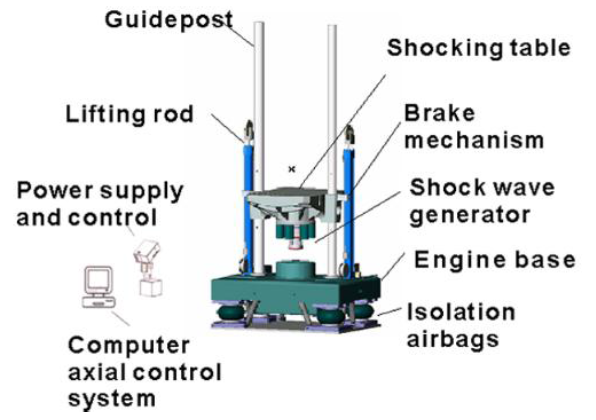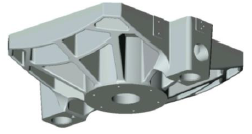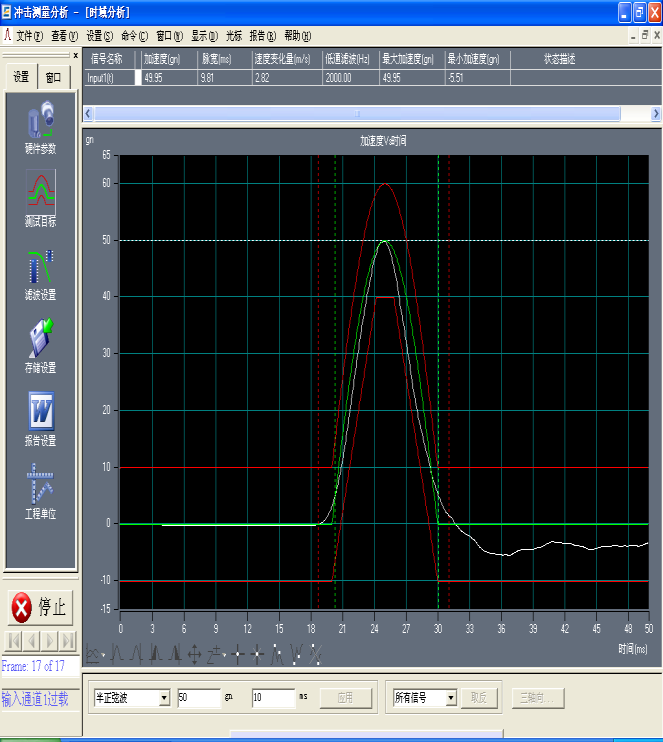Battery Mechanical Shock Test Equipment Shock Testing System With Built-in Different Waveform Generators
Battery Mechanical Shock Test Equipment Shock Testing System With Built-in Different Waveform Generators
- Model:
Battery Mechanical Shock Test Equipment Shock Testing System With Built-in Different Waveform Generators
HSKT10 Mechanical Shock Tester
Proposal Description
1 Product application
The shock testing system of HSKT series are mainly applicable to shock resistance tests in such fields as electronic products, aerospace, shipping, military industry, automotive parts and transportation. Shock tests in form of half sine wave, final peak saw tooth wave or trapezoidal wave shock tests can be carried out by selecting different waveform generators.
The equipment conforms to such testing specifications as GB/T2423-2008, GJB150, GJB360, GJB548, GJB1217, MIL-STD-202F, IEC-68-2-27, MIL-STD-810F, MIL-STD-883E,
Structural schematic diagram of SKT series mechanical shock tester

2 Main performance
1 Free drop type shock tester using hydraulic lifting and HP fluid braking;
2 Use of pneumatic-hydraulic boosting and strong friction brake to prevent secondary shock braking;
3 Shock measurement device: single-channel data acquisition, simultaneous acceleration data measurement, storage, report printing, data callback, database management of two channels.
4 Use of rubber module, producing a wide range of half sine pulse with arbitrary action time.
5 Availability for equivalent drop test of packing boxes.
3 Equipment configuration
| configuration No. | Equipment name | Model | Qty. |
| 1 | Shock tester table | HSKT10 | 1set |
| 3 | Controller | SKC-1 | 1 set |
| 4 | Shock measurement device | ST-2 | 1 set |
| 5 | Sensor | LAB | 1pcs |
| 6 | Control computer | 1 set | |
| 7 | Waveform generator | HB01 | 1 set |
| 8 | Safety device | Audible and visual alarm | 1 set |
| 9 | Attached accessories | Tools, clamps/instructions, installation disc, etc. | 1 set |
II Technical Parameters
| Operating platform | 200 × 200 mm |
| Max. load | 10KG |
| Peak acceleration | 20 to 1500G (customization acceptable) |
| Pulse duration | 0.5~11ms (customization acceptable) |
| Equipment dimensions | 560×670×2390mm |
| Equipment weight | 650 kg |
| Power required | 220VAC±10% 50Hz,2kVA |
| Measuring system | |
| Input channels | 2 channels |
| Sampling frequency | 192KHz |
| Pulse duration | 50-1ms |
| Communication interface | USB2.0 |
| Supportive standard | ISO, UN38.3,MIL-STD-810, user defined |
| Operating system | Microsoft Windows7/8 |
| System acceleration sensor | |
| Brand | LAB |
| Model | 23108 |
| Output mode | Charge type |
| Sensitivity | 3.93pC/g |
| Frequency range | 0.5 to 12KHz |
| Acceleration range | ±2500G |
| Operating environment | -40 to +160℃ |
III Introduction to Equipment Performance
1 Operating platform
High-strength imported aluminum alloy operating platform.

3 Lifting height control
The lifting height is measured by a photoelectric encoder module installed on the base, and the photoelectric encoder module has high accuracy, strong anti-interference capability and high reliability, thus ensuring shock repeatability.
4 Braking system
Air brake and strong friction brake are applied to prevent secondary shock braking, thus ensuring prompt and reliable braking to prevent secondary bounce.
5 Buffer system
The buffer system is consisted of a base, a damper and a gasbag. The buffer system can reduce the shock force transferred from the working platform to the ground.
6 Waveform generator
6.1 Plate-typed half sine wave: for achieving different shock pulse widths (1 to 30ms)
Trapezoidal wave: special cylinder
7 Safety device
Emergency stop switch: It switches off the circuit in emergency cases by forcibly disconnecting welded contacts of the actuating mechanism.
Optional: safety mat
8 Introduction to the shock measuring system and its features
The system conforms to MIL-STD-810, GJB-150-18-86 and IEC68-2-27 standards, and has accurate and prompt shock wave capture capability. The max. sampling rate is 1MHz, therefore, you need not worry about omission of minor shock events.
The system is also an integrated solution, you need not be busy with waveform viewing and recording, as the system can capture shock event and generate report, more importantly, the system can provide you with shock response spectrum analysis (SRS) to facilitate effective assessment of potential damage from shock pulse to the actual system. At last, the auxiliary analysis on force deformation and shock response can enable to understand more details about the shock results.
Features of the measuring system
It conforms to MIL-STD-810, GJB-150-18-86, IEC68-2-27 and DELL standards.
The max. sampling frequency is up to 1MHz.
The max. testing acceleration is 100000gn.
The min. testing pulse width is 0.1ms.
It has the features of multi-frame waveform recording and playback.
It supports internal and external triggering.
Analysis functions:

Transient capture of shock waveform
You can obtain single or multiple pulses with transient capture. The system can automatically analyze data of shock pulse, including peak value, pulse width, rate of speed change and head injury index (HIC), automatically match the captured pulse waveform to ideal waveform, and compare their deviation.
Shock response spectrum analysis
The shock response spectrum analysis enables assessment on potential damage arising from shock, thus providing basis for designing shock resistance of products. The system can perform SRS analysis on each shock pulse, and compare the deviation between actual SRS and objective SRS.
Other analysis
Essential analysis in shock test includes force deformation analysis, shock response demonstration and rotary shock analysis. Peak force, deformed peak value, power and energy produced by pulse are calculated in the force-deformation analysis. Tools for learning shock response spectrum are provided in the shock response demonstration. Rotary shock analysis is used for rotary shock machines or other rotary control events, and the signal can be obtained by measuring and calculating axial acceleration
V Site requirements
1. Power supply: 220V±10% 50Hz
2. Independent isolated power supply
3. Air supply:0.5--0.8MPa
4. Using environmental conditions:
Temperature Rang::RT℃~35℃;
Humidity range:0--85RH%;
Installation location: flat ground, no corrosive gas surrounded, less dust.
5. Appropriate unloading, handling tools shall be prepared by customer.